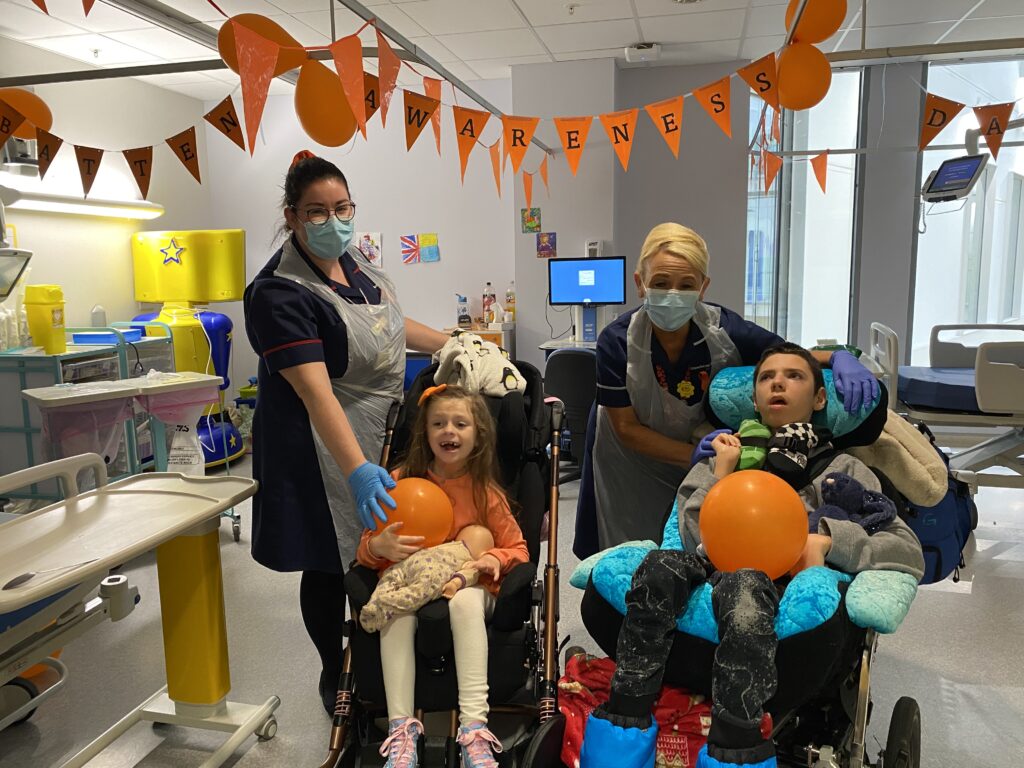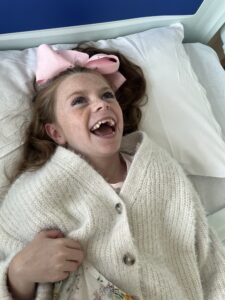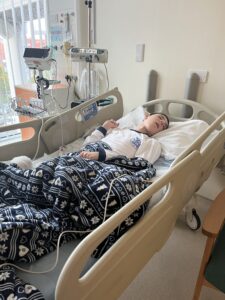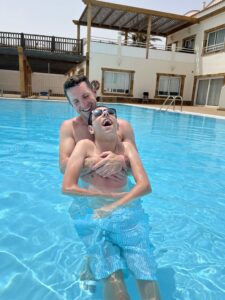Ollie Carroll, 13, and his sister Amelia, 10, were born with Late Infantile Batten Disease, a rare genetic disease of which only 30 children in the UK currently live with.

Such is the rarity of the disease, treatment from the NHS only became available in the last ten years.
 In 2022, Royal Manchester Children’s Hospital opened a new service to provide the important treatment for families across much of the North of England. The treatments require an infusion to the brain, a procedure which takes an entire day and must be done every fortnight. It’s proved to be life changing for families, who had previously needed to travel all the way to London’s Great Ormond Street Hospital to get the care their children needed.
In 2022, Royal Manchester Children’s Hospital opened a new service to provide the important treatment for families across much of the North of England. The treatments require an infusion to the brain, a procedure which takes an entire day and must be done every fortnight. It’s proved to be life changing for families, who had previously needed to travel all the way to London’s Great Ormond Street Hospital to get the care their children needed.
Lucy and Mike, Ollie and Amelia’s parents, described the years they have spent with the Royal Manchester Children’s Hospital service as a lifeline for their family, having had to work incredibly hard to navigate a pathway to their children’s care.
On their journey to getting treatment for their children, they’ve met Prince Harry, pleaded their case for treatment on the NHS in the Houses of Parliament, and travelled to different countries to talk about their story and how doctors can improve practice.
Lucy said of how Batten Disease has impacted her family:
“Batten disease is where an enzyme that gets rid of waste is missing from the brain. Without it, cells die and skills are lost, which is strange thing to comprehend when you remember both children were born perfectly healthy.
“It wasn’t until they were a couple of years old that symptoms started to present themselves. By the time Ollie was three he was becoming clumsy and delayed in his speech, six months later he had his first seizure and by six he had lost everything; he couldn’t walk, talk or eat and had lost his vision.
“Treatment was previously only being available at Great Ormond Street Hospital. The staff there were great, but getting from Poynton to central London was such an ordeal for us.
“Our day was; wake up in the early hours of the morning, get the train down with the Ollie and Amelia plus their three siblings, stay over in a hotel, stay all the next day for treatment, stay overnight on the ward and go home the next day. Then covid came and we had to squeeze all of that, plus the drive down and back, into 24 hours.”
 “Royal Manchester Children’s Hospital is the only centre in the North, other than Newcastle, that will take on any child with Batten Disease and they’ve changed our lives. The families of Batten sufferers are a tight group and it’s not just us they are helping, there are caring for families in Liverpool, Leeds and more.
“Royal Manchester Children’s Hospital is the only centre in the North, other than Newcastle, that will take on any child with Batten Disease and they’ve changed our lives. The families of Batten sufferers are a tight group and it’s not just us they are helping, there are caring for families in Liverpool, Leeds and more.
“They’ve also worked with us to implement a revolutionary way of performing the infusions. I saw in the US and Australia they had developed a method where the infusion could be done through a port in the chest. Ordinarily the needle is applied through a port directly to the brain, which as you can imagine is very uncomfortable and often impractical.
“I asked the doctor at Royal Manchester Children’s Hospital if they could do the same here, whilst they said it wasn’t something they do now they were happy to take a look at it and see if it was a practice they could adapt.
“I asked the families abroad if they’d be happy to share their medical notes and they all obliged, it’s a tight community and we all want to help each other. We then passed these onto our doctor who went through all the proper processes to get it adopted as standard practice at Royal Manchester Children’s Hospital. It’s a massive improvement and also a nice feeling to know others will now benefit from it too.
“It’s just one example of how brilliant the care has been in Manchester, being there has been life changing. They’ve been so loving and caring towards us and the kids whilst always remaining professional. Every colleague, whether they’ve been a nurse, doctor or whoever, has gone out of their way to make our lives easier.”
Ollie and Amelia were initially put on a Managed Access Agreement by The National Institute for Health and Care Excellence (NICE) for their treatment. With that agreement coming to an end this year, they along with others must once again put forward their case to NICE for the treatment, which costs £250,000 per child, to be provided on the NHS.
“Over the last five years, data has been collected on the effectiveness of treatment which will be analysed by NICE and reviewed to help inform their decision. I’ve been nominated to participate in the evaluation as a patient expert alongside a couple of others.
“It’s obviously a very stressful time for all families affected by this disease. If the treatment cannot be funded, then our children will very quickly deteriorate and pass away. It’s a life and death matter which is why we’re still working our hardest to help make it happen.
 “Our children are our lives, Ollie and Amelia are such characters even if they are like chalk and cheese. Ollie is chilled, loves his hydrotherapy, being outside in the sun and around people and also likes listening to stories – whether that’s us or staff at Royal Manchester Children’s Hospital sat with him during his infusions. Amelia is more of a diva, very strong willed with real fight in her, but loves dolls and being around people. She is blind as well now, but still enjoys going on holiday, to shows and to the theatre.
“Our children are our lives, Ollie and Amelia are such characters even if they are like chalk and cheese. Ollie is chilled, loves his hydrotherapy, being outside in the sun and around people and also likes listening to stories – whether that’s us or staff at Royal Manchester Children’s Hospital sat with him during his infusions. Amelia is more of a diva, very strong willed with real fight in her, but loves dolls and being around people. She is blind as well now, but still enjoys going on holiday, to shows and to the theatre.
“Since the start all those years ago, we’ve spent thousands of hours travelling to meet people, campaigning, reading up on how different health bodies work, what different terminologies mean, what processes need to be followed and so on – but I guess when you’re a parent you just do what you need to do for your kids and you find an extra gear. I hope the amazing care we have received will be allowed to continue.”